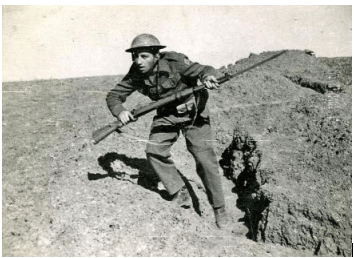 I was born in Poland on 22nd October 1929, and arrived in Canada in September 1930. I was in school until I left for Palestine early in 1948. In my youth I was actively involved as a member of a Young Judea Zionist group.
I was born in Poland on 22nd October 1929, and arrived in Canada in September 1930. I was in school until I left for Palestine early in 1948. In my youth I was actively involved as a member of a Young Judea Zionist group.
I left for New York via Toronto and I made my way through Niagara Falls, where U.S. custom officials took me off the train and interrogated me as to where I was going, for how long, and for what purpose. They kept me there all night, and as a result I missed my train going to New York. Eventually, I arrived in New York and was met by a fellow Winnipeger.
When I was leaving Winnipeg, I had accidentally bumped into a rather large individual at the railway station, causing him to drop an expensive bottle of Scotch. He was so angry that he turned on me and threatened to punch me out. However, his train was just beginning to pull out of the station, and he figured he just didn’t have the time to teach me a proper lesson.
I had a phone number to contact in New York. I called it, and was told to report to a certain room at the Edison Hotel. When I arrived at the hotel and knocked on the door, the person who answered the door was the same fellow whose bottle of Scotch I had broken in Winnipeg. Luckily, time heals all wounds, and he decided to forgive, if not forget.
There were thirty-one Canadian volunteers in the small room we were assigned to. After a two-day stay we were given boat tickets for the journey to France by a Haganah officer, who insisted that we pair up and not talk to anyone else on the ship. We were told that a contact would be waiting for us at Le Havre when we docked.
We arrived at Le Havre, disembarked, went through French customs and immigration, and then stood around in our twosomes trying to look inconspicuous (and not succeeding) while everyone else departed the quay. We began to feel somewhat neglected and more than a bit concerned, when a fourteen-year-old girl, whom we’d noticed earlier but ignored because of her youth, approached us, said the right words, and provided us with train tickets to Paris.
After a short stay in Paris, we proceeded to Grandes Arénas camp, and after a period of training, we all left for Palestine. Most of my group got passage on that great ocean-going “liner,” the 100-ton three-masted “Marie Annique,” may she rest in peace.
On arrival in Israel I joined the 4th Antitank Troop. Shortly before “Operation Hiram” began in October 1948, I went with one of our half-tracks to the northern front. Herbie Fishbein, a Machalnik from New Jersey, went with a second half-track. During the action in the Galilee, my half-track ran over a mine and became disabled. We came under enemy fire and decided, for want of a better plan, to continue firing at the enemy. A while later, after the firing had died down, Herbie drove up in his half-track to see if we were okay. By this time the other members of the crew had been taken to a first-aid station to check on their condition. I tell myself that I was probably still in shock from being blown up by a mine, which is why I told Herbie that all the others had been killed. To this day Herbie won’t speak to me.
Returning to our 4th Troop antitank unit, we were involved in “Operation Horev.” Our group would support the Palmach Negev Brigade attacking Auja-al-Hafir from the north, in conjunction with the 89th Commando Battalion. During this attack, Jason Fenton and I had dug a foxhole to take cover from the Egyptian mortar fire, when a
3-inch mortar shell landed about 10-feet from our position, but somehow failed to explode.
After the war, I remained in officer’s training school until I was discharged in December 1949. I then returned to Winnipeg, got married and have been there ever since.
Author: Allan Chapnick
Reproduced in part with the permission of Dr. Jason Fenton from his book “Strength and Courage.”

